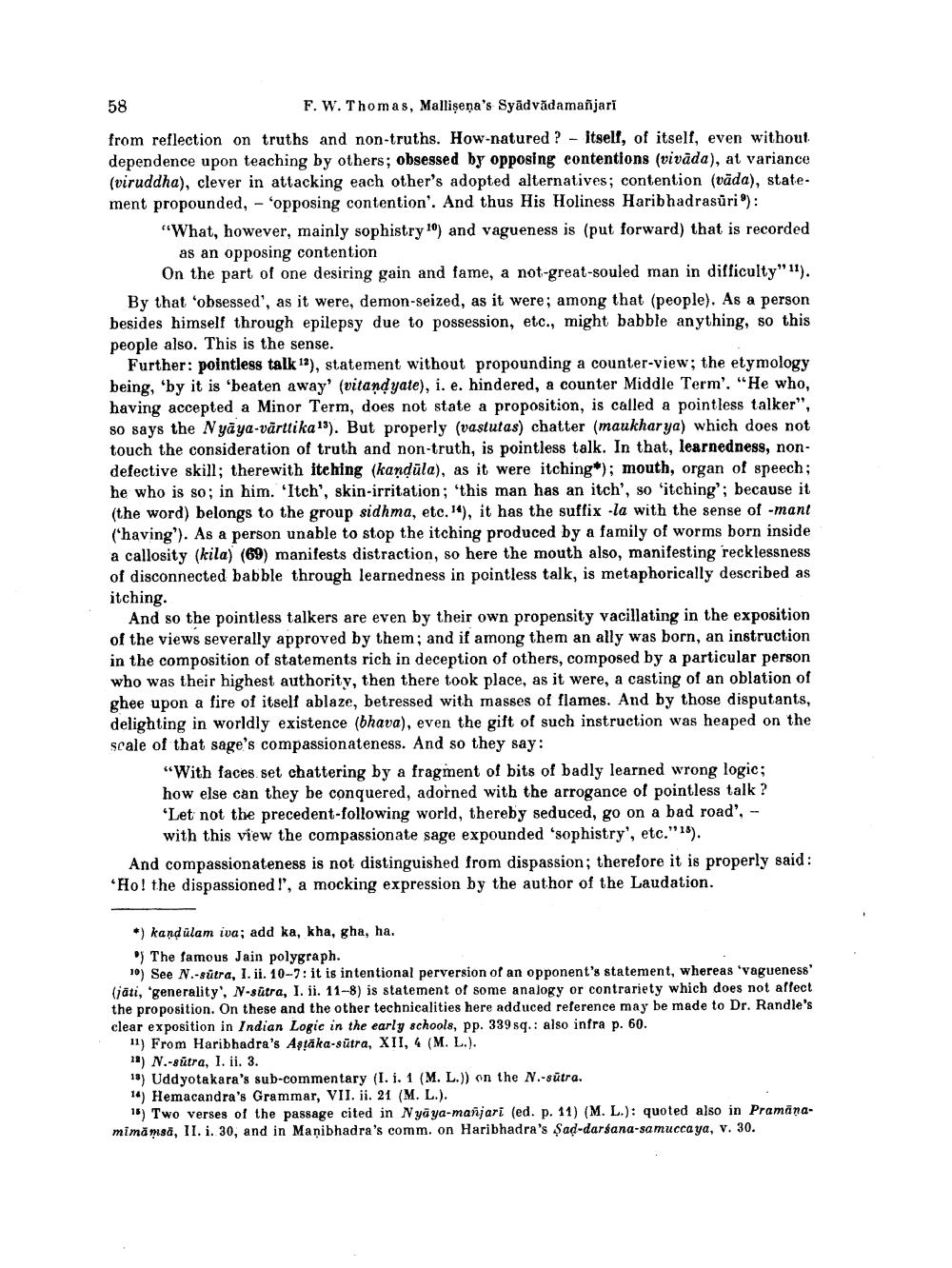________________
58
F. W. Thomas, Malliṣena's Syadvādamañjarī
from reflection on truths and non-truths. How-natured? itself, of itself, even without dependence upon teaching by others; obsessed by opposing contentions (vivada), at variance. (viruddha), clever in attacking each other's adopted alternatives; contention (tada), statement propounded, - 'opposing contention'. And thus His Holiness Haribhadrasuri"):
"What, however, mainly sophistry) and vagueness is (put forward) that is recorded as an opposing contention
On the part of one desiring gain and fame, a not-great-souled man in difficulty"). By that 'obsessed', as it were, demon-seized, as it were; among that (people). As a person besides himself through epilepsy due to possession, etc., might babble anything, so this people also. This is the sense.
Further: pointless talk 12), statement without propounding a counter-view; the etymology being, 'by it is 'beaten away' (vitandyate), i. e. hindered, a counter Middle Term'. "He who, having accepted a Minor Term, does not state a proposition, is called a pointless talker", so says the Nyaya-värttika 13). But properly (vastutas) chatter (maukharya) which does not touch the consideration of truth and non-truth, is pointless talk. In that, learnedness, nondefective skill; therewith itching (kaṇḍula), as it were itching*); mouth, organ of speech; he who is so; in him. 'Itch', skin-irritation; 'this man has an itch', so 'itching'; because it (the word) belongs to the group sidhma, etc. 14), it has the suffix la with the sense of -mant ('having'). As a person unable to stop the itching produced by a family of worms born inside a callosity (kila) (69) manifests distraction, so here the mouth also, manifesting recklessness of disconnected babble through learnedness in pointless talk, is metaphorically described as itching.
And so the pointless talkers are even by their own propensity vacillating in the exposition of the views severally approved by them; and if among them an ally was born, an instruction in the composition of statements rich in deception of others, composed by a particular person who was their highest authority, then there took place, as it were, a casting of an oblation of ghee upon a fire of itself ablaze, betressed with masses of flames. And by those disputants, delighting in worldly existence (bhava), even the gift of such instruction was heaped on the scale of that sage's compassionateness. And so they say:
"With faces set chattering by a fragment of bits of badly learned wrong logic; how else can they be conquered, adorned with the arrogance of pointless talk? 'Let not the precedent-following world, thereby seduced, go on a bad road', -- with this view the compassionate sage expounded sophistry', etc.").
And compassionateness is not distinguished from dispassion; therefore it is properly said: 'Ho! the dispassioned!', a mocking expression by the author of the Laudation.
*) kandulam iva; add ka, kha, gha, ha.
The famous Jain polygraph.
10) See N.-sutra, I. ii. 10-7: it is intentional perversion of an opponent's statement, whereas 'vagueness' (jati, 'generality', N-sutra, I. ii. 11-8) is statement of some analogy or contrariety which does not affect the proposition. On these and the other technicalities here adduced reference may be made to Dr. Randle's clear exposition in Indian Logic in the early schools, pp. 339 sq.: also infra p. 60.
11) From Haribhadra's Astaka-sutra, XII, 4 (M. L.).
18) N.-sutra, 1. ii. 3.
18) Uddyotakara's sub-commentary (I. i. 1 (M. L.)) on the N.-sutra.
14) Hemacandra's Grammar, VII. ii. 21 (M. L.).
15) Two verses of the passage cited in Nyaya-mañjarī (ed. p. 11) (M. L.): quoted also in Pramāṇamimämsä, II. i. 30, and in Manibhadra's comm. on Haribhadra's Sad-darśana-samuccaya, v. 30.




